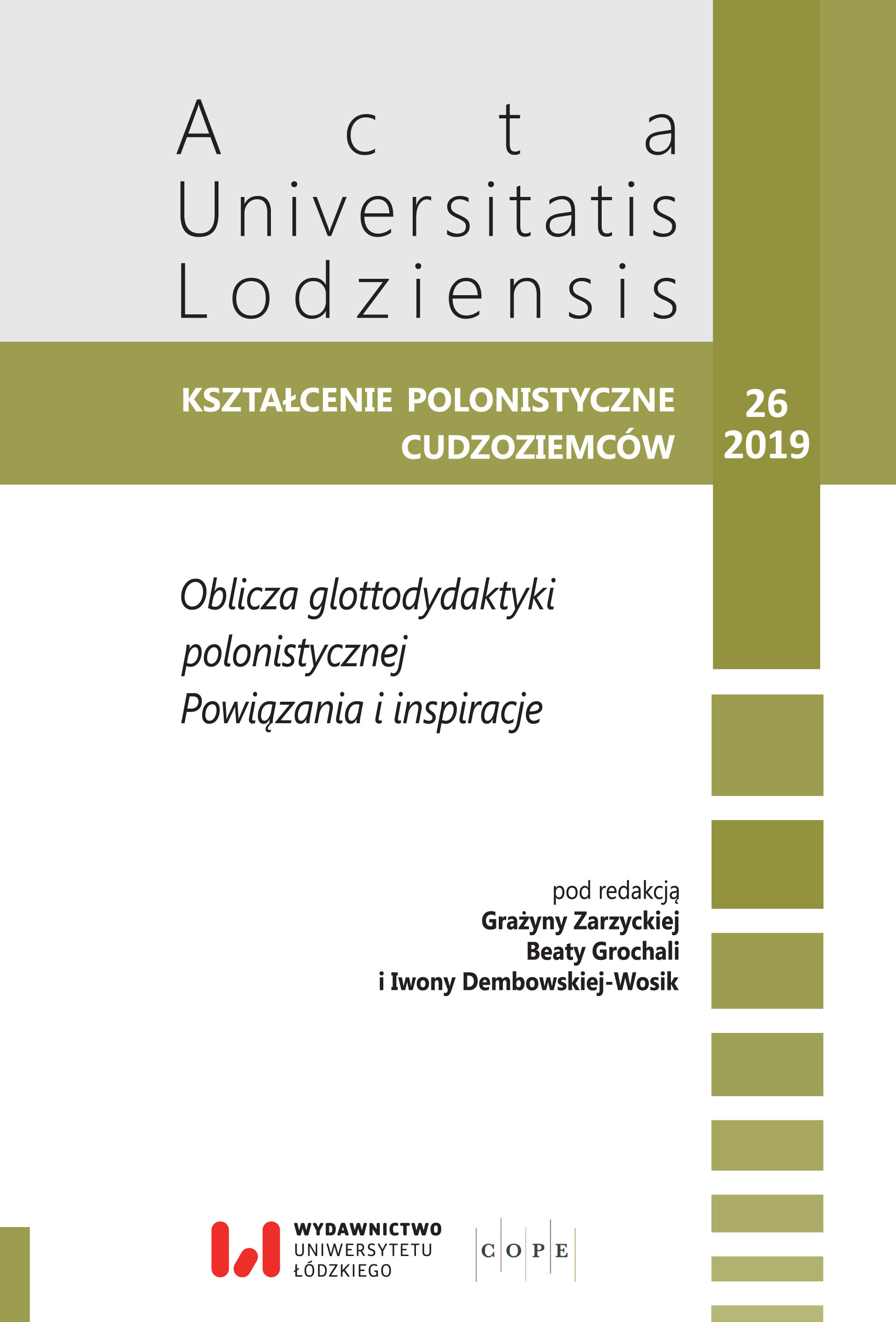Social media in foreign language teaching and learning – a review
DOI:
https://doi.org/10.18778/0860-6587.26.09Keywords:
social media, autonomy, interaction, motivation, identity management, FacebookAbstract
The main purpose of this review is to present why and how social media can be applied in language teaching and learning, as seen from the point of view of practitioners. Vygotskian constructionism has provided the theoretical framework for the investigation. The wide availability of social media and their high penetration rate are seen as key advantages. The stress has been put on the fact that such platforms enable users to interact with others and acquire the target language in their own community of practice. The learning process, thus, gets enriched by both individual and collaborative dimensions. Negotiation of meaning, as well as the autonomy in creating one’s new identity and customizing the study content, become crucial aspects of the experience. Assuming accountability for one’s own learning results in increased intrinsic motivation to bridge the gap between the current level of knowledge and the desired proficiency level. Finally, certain features of social media that allow instructors to use them in class are discussed.
References
Austin R., Anderson J., 2010, Building Bridges Online: Issues of Pedagogy and Learning Outcomes, in: L. Tomei (ed.), Intercultural Education Through Citizenship, Chapter 1, New York, pp. 189–198.
Google Scholar
Blattner G., Lomicka L., 2012, Facebook-ing and the Social Generation: A New Era of Language Learning, “Alsic [En ligne]”, vol. 15, no. 1, https://doi.org/10.4000/alsic.2413
Google Scholar
boyd d. m., Ellison, N., 2007, Social Network Sites: Definition, History, and Scholarship, “Journal of Computer-Mediated Communication” 17, December, pp. 210–230, https://doi.org/10.1111/j.1083-6101.2007.00393.x
Google Scholar
Conole G., 2010, Personalisation through Technology-Enhanced Learning, in: John O’Donoghue (ed.), Technology-Supported Environments for Personalized Learning: Methods and Case Studies, Information, Science, Reference, New York, pp. 1–14.
Google Scholar
Csíkszentmihályi, M., (1991), Flow: The Psychology of Optimal Experience. Steps Toward Enhancing the Quality of Life, Philadelphia.
Google Scholar
Downes S., 2010, Learning Networks and Connective Knowledge, in: H. Hao Yang, S. Chi-Yin Yuen (ed.), Collective Intelligence and E-Learning 2.0: Implications of Web-Based Communities and Networking. New York, pp. 1–26.
Google Scholar
Dörnyei Z., Hadfield, J., 2014, Motivating Learning, London–New York.
Google Scholar
Erben T., Ban R., Castañeda M., 2008, Teaching English Language Learners through Technology, London–New York.
Google Scholar
Harrison R., Thomas M., 2009, Identity in online communities: social networking sites and language learning, “International Journal of Emerging Technologies and Society”, no. 7(2). pp. 109–124.
Google Scholar
Huang H., Cordella M., Browning C., Baumgartner R., 2016, An Innovative Model for Second Language Learning and Social Inclusion, in: M. Cordella, H. Huang (ed.), Rethinking Second Language Learning: Using Intergenerational Community Resources, Bristol, pp. 226–237.
Google Scholar
McBride K., 2009, Social-Networking Sites in Foreign Language Classes: Opportunities for Re-creation, “The next generation: Social networking and online collaboration in foreign language learning”, vol. 8, Chapter 3, pp. 35–58.
Google Scholar
Mondahl M., Razmerita L., 2014, Social media, Collaboration and Social Learning – a Case-study of Foreign Language Learning, “The Electronic Journal of e-Learning”, vol. 12, issue 4, pp. 339–352.
Google Scholar
Moran M., Seamann J., Tanti-Kane H., 2011, Teaching, Learning, and Sharing: How Today’s Higher Education Faculty Use Social Media, Boston.
Google Scholar
Newland B., Papaefthimiou M. C., 2010, e-learning: Institutional Provision and Student Expectations, in: J. O’Donoghue (ed.), Technology-Supported Environments for Personalized Learning: Methods and Case Studies, New York, pp. 74–90.
Google Scholar
Promnits-Hayashi L., 2011, A learning success story using Facebook, “Studies in Self-Access Learning Journal”, no. 2(4), pp. 309–316.
Google Scholar
Rivers D., Houghton S. A., 2013, Identities in Foreign Language Education, in: D. J. Rivers, S. A. Houghton, Social Identities and Multiple Selves in Foreign Language Education, London, pp. 1–13.
Google Scholar
Royal, C., 2011, Thinking Critically About New Media, in: R. O’Connell (ed.), Teaching with Multimedia. Pedagogy in the Websphere, vol. 1, Creskill, New Jersey, pp. 13–30.
Google Scholar
Snyder Ohta A., (2009). Second Language Learning Acquisition Process in the Classroom: Learning Japanese. New York.
Google Scholar
Talaue G. M. et al, 2018, The Impact of Social Media on Academic Performance of Selected College Students, “International Journal of Advanced Information Technology (IJAIT)”, vol. 8, no. 4/5, pp. 27–35.
Google Scholar
Wang Q., Huay Lit Woo, Choon Lang Quek, Yuqin Yang, Mei Liu, 2011, Using the Facebook group as a learning management system: An exploratory study, “British Journal of Educational Technology”, https://doi.org/10.1111/j.1467-8535.2011.01195.x
Google Scholar
Wenger E., 2006, Communities of Practice: A Brief Introduction, www.ewenger.com/pub/pubpapers.htm [28.08.2019].
Google Scholar
Willging, P., 2008, Online Interactions: Comparing Social Network Measures with Instructors’ Perspectives, in: R. Zheng, S. Pixy Ferris (eds.), Understanding Online Instructional Modeling. Theories and Practices, New York, pp. 150–167.
Google Scholar
Wlodkowski, R. J., Ginsberg, M. B., 2010, Teaching Intensive and Accelerated Courses. Instruction That Motivates Learning, San Francisco.
Google Scholar
Wood, C., 2010, Science for Everyone. Visions for Near-Future Educational Technology, in: L. Tomei (ed.), ICTs for Modern Educational and Instructional Advancement: New Approaches to Teaching, New York, chapter 29, pp. 344–354.
Google Scholar
Yim S., Warschauer M., 2019, Student Initiating Feedback: The Potential of Social Media, in: K. Hyland, F. Hyland (eds.), Feedback in Second Language Writing: Contexts and Issues, Cambridge, pp. 285–304.
Google Scholar
Global Web Index Social Media Flagship, https://www.globalwebindex.com/hubfs/Downloads/Social-H2-2018-report.pdf [12.05.2019].
Google Scholar
https://newsroom.fb.com/company-info/#statistics [12.05.2019].
Google Scholar
https://www.statista.com [12.05.2019].
Google Scholar
https://zephoria.com/top-15-valuable-facebook-statistics/ [12.05.2019]
Google Scholar
Downloads
Published
How to Cite
Issue
Section
License

This work is licensed under a Creative Commons Attribution-NonCommercial-NoDerivatives 4.0 International License.










